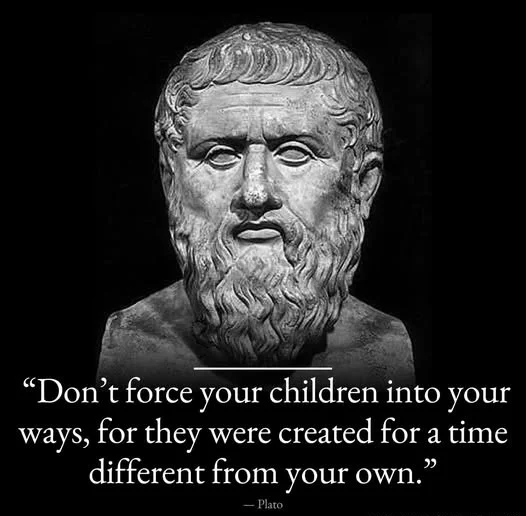Each generation has its own unique characteristics and circumstances, so imposing the values and thoughts of the previous generation on the next one is not always the best choice. This is an issue that the famous philosopher Plato discussed a long time ago. Plato, who founded one of the first academies in the West, believed that each generation should have the freedom to explore and build its own path, rather than merely following the principles of the previous generation.
Plato said: “Do not force your children to live as you did, for they were born in a different time from yours.” This statement not only reflects a deep understanding of societal development but also serves as advice on parenting in a constantly changing world. In fact, each era brings profound changes in technology, society, and human needs. The new generation needs opportunities and space to freely create and develop, rather than being constrained by outdated patterns.

One prominent theory in the study of education and personal development is the “self-learning and self-creation” theory. According to this theory, encouraging self-exploration, creativity, and independence is crucial for children’s sustainable development. Imposing the desires and standards of the previous generation can create invisible barriers to the natural development of the younger generation.
“The only way to create a creative society is to encourage the freedom of thought and the limitless creative abilities of the younger generation.” This is the statement of Professor Howard Gardner, a renowned psychologist and the founder of the theory of multiple intelligences. From a scientific perspective, imposing too many expectations on children can stifle their potential. Instead, providing conditions for children to develop according to their personal identity, promoting self-learning and creativity, is the key to helping the new generation thrive.
A study published in the Psychological Science journal in 2018 showed that when children are encouraged to freely experiment, even fail, and learn from their mistakes, their creativity and independent thinking will develop much stronger. This is a key factor in creating a generation capable of adapting and innovating in a constantly changing society. When parents only impose their expectations without accompanying their children in the developmental process, it can lead to dissatisfaction and a lack of confidence in children.

Consider a simple yet very common example: A child loves drawing but is forced by their parents to pursue a “secure” profession like medicine or engineering. Over time, the child not only loses their passion for art but also feels a lack of freedom in life. As a result, the child may live an unsatisfying life, lacking the creativity necessary for personal development.
“Children are not the property of their parents; they are individuals born to explore the world in their own way.” – from the work The Prophet by Kahlil Gibran, a famous philosopher. This awareness emphasizes that parents should be guides, supporters, and encouragers, rather than attempting to control their children’s lives.
Therefore, instead of forcing their children to live as they did, parents should create a loving and free environment where children can learn, explore, and freely develop their potential. This not only helps children find passion and joy in life but also contributes to shaping a generation capable of change and creativity in the future.


HPX24h > Parenting Tips > Why You Can’t Force Your Child to Live the Way You Do?
Top Reads from This Category
Parenting Tips
Causes and Solutions for Aggressive and Strong-Willed Behavior in Children
Parenting Tips
How Much Sleep Do Children Really Need?
Parenting Tips
Excessive Night Sweating in Children – A Normal Occurrence or a Cause for Concern?
Parenting Tips
Teaching Children Respect: Simple Tips for Parents with Kids Aged 6 to 8
Parenting Tips
Fun Facts for 3-Year-Olds: Exploring the World of Animals and New Foods
Parenting Tips
Talking to Children About Race: How to Make It Easier?
Parenting Tips
How to Talk to Your Child About Divorce: Helpful Tips for Parents
Discover New Topics
Fitness
Which Exercise Burns the Most Calories? Tips for Choosing and Training Effectively
Fitness
Muscles: The Golden Key to Effective Health and Performance
Animals
The Potential of Black Mamba Venom in Developing New Painkillers
Fitness
Safe Exercises for Early Pregnancy: Tips to Keep Moms Healthy and Strong
Science
Science Uncovers the Brain’s Process of Storing New Ideas
Healthy Eating
Does Drinking Water Help with Weight Loss? The Science Behind It and How to Apply It Properly
Space
18 New Planets: Unlocking the Gateway to Exploring Giant Star Systems
Healthy Eating
How Many Calories Do You Need Each Day to Maintain Optimal Health?
Parenting Tips
Sleep Apnea in Preschoolers: Understanding It to Protect Your Child’s Health
Fitness
The Secret to Holistic Health: Aerobics and Its Role in Preventing Cardiovascular Disease
Parenting Tips
Discover How Japan’s Education System Creates Self-Disciplined, Responsible Students Without the Need for Pressure
Health
The Best Days to Get Pregnant: How to Accurately Time Your Ovulation?
Health
Can Gray Hair Be Restored? What Science Says About Regaining Natural Hair Color